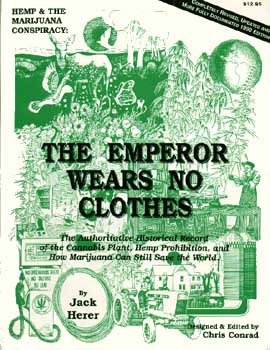As we finish out our month of highlighting the cannabis heroes and activists who paved the way for the modern cannabis movement, today we celebrate the life of Jack Herer, aka ‘The Hemperor.’
So far, our profile series has featured Dennis Peron, Bob Marley, “Brownie” Mary Rathbun, and Baba Ram Das. However, as we move into the rest of 2020 and beyond, we must take special effort to remember all of the unnamed heroes of cannabis: the protestors, supporters, and countless drug war victims who sacrificed their freedom to upend our unjust laws.
Early life
Jack Herer was born in New York City on June 18, 1939, the youngest of three children. Even then he broke the norm, dropping out of high school to join the Army. As a young man, he served as an Army police officer in Korea, eventually returning to the States as a Pro-War Republican with conservative values. The young man was so conservative that he threatened to leave his first wife because she had tried smoking pot in the early ‘60s. He also resented the counter culture around him and adamantly believed that the hippy movement and smoking pot were for bad people with bad agendas. He and his wife relocated to Los Angeles, California in 1967. They divorced soon after.
In his years as a single young man in the epicenter of hippie culture, Herer eventually started dating a woman who regularly enjoyed cannabis. She tried to get him to smoke a few times and he kept blowing out each hit before inhaling, then would claim that pot had no effect on him. The excuse worked until she brought home an ounce of premium Acapulco Gold in the summer of 1969, the woman, whose name isn’t listed in any recounts of the story, made it clear that this was expensive stuff. Because of the cost and excitement over the new pheno, Herer made sure to hold it in and really try to get stoned — and oh, did he get stoned.
While Herer was coming up, his girlfriend clasped headphones over his ears and the 30-year-old had a synesthesia-like experience as his mind’s eye watched the notes interact and play with one another. As he said in a video interview, after smoking pot for the first time he found himself thinking, “I’m 30 years old and this is the first time that I ever knew music had music in it!”
After actually inhaling and understanding the beauty of expanding your awareness, there was a shift in Herer. It was as if he had awakened to a new part of reality. From that point forward, he threw himself into studying everything that he could about the plant and those who used it.
A passionate awakening
In 1973, Herer used his new expertise on the subject to co-author the comic ‘zine Great Revolutionary American Standard System: The Official Guide for Assessing the Quality of Marijuana on the 1 to 10 Scale, or G.R.A.S.S. for short. The coloring book for adults was sold at underground bookstores around LA and Herer toured to promote it. At these events, he learned amazing, random facts about the hemp plant from people who supported his work and for years would save each tidbit to be later included in his work.
At this time he was building smoking accessories and was part-owner of a hemp store called High Country on Venice Beach. He also set up a stand on the boardwalk where he became a fixture in the eclectic neighborhood of characters, talking to everyone and anyone about the wonders of hemp. His work with High Country eventually led him to Ed “Captain Ed” Adair, a fellow smoke shop owner, and the pair agreed to work together on legalization efforts until marijuana was legal, everyone imprisoned for cannabis was released, or they turned 84. Captain Ed passed in 1991, but legalization would continue to be the focus of Jack Herer’s life until the end.
Legendary activist
The straight-laced, Republican Army police officer was now a tie-dye wearing, Grateful Dead following hippie. Instead of hoping to befriend stars of the Los Angeles hippy generation like Jim Morrison and the Beach Boys, Herer spent his time with another crowd. He often found himself under bridges with local homeless veterans, learning about their plights and how necessary cannabis-use was to their mental health and wellbeing. Eventually, it was these same veterans that would help the Hemperor collect signatures for his many cannabis legalization initiatives. Though he was now a hippy, he was still a firm believer in the power of American democracy and spent much of his free time registering people to vote.
Jack Herer was given a $5 ticket one day in the early 1980’s while registering voters in an un-permitted area, he refused to pay the fine and in 1983 that landed him in federal prison for two weeks. This jail time became more important than he could have known because it is where he began writing The Emperor Wears No Clothes on looseleaf paper.

After his release, Herer relocated to Portland, Oregon where he opened The Third Eye Shoppe, a head shop in the hippie neighborhood of town. In 1985, The Emperor Wears No Clothes was published on hemp paper and Herer set out on a years-long cross-country-and-back-again road tour. He was so confident in his 12 years of research that he bravely offered $100k to anyone who could disprove his assertions about the hemp plant.
The 6’, 250 lb. activist was always a boisterous, noteworthy character and by the time he grew his wild beard, he had become somewhat of a legend in the legalization movement. He staged many protests in DC and was known to protest in colonial garb to highlight the fact that our forefathers were hemp growers. His fight for legalization and his pact with Captain Ed lived on until he suffered a heart attack backstage after speaking at an Oregon hemp rally in 2009.

For months, Herer spent time with his wife Jeannie at their Eugene home until his passing on April 15, 2010, two years before cannabis legalization was approved in Colorado and four years before it would become available for legal sale in Oregon.
The Third Eye Shoppe would remain a family operation until 2017 when his son Mark was forced to sell to real estate developers. The sale was a shock to many Oregonians who cherished the cannabis legend’s memory, but the second generation shop owner had incurred a $600k loss due to the opening of cannabis dispensaries throughout Oregon the year prior. These shops now sold the same pipes, bongs, and accessories as a headshop, alongside legal weed. The irony of a store built by a founding father of cannabis legalization being shut down due to legalization isn’t lost on the many who know the tale. In fact, it is paralleled around the country as legacy growers are slowly edged out of a market that they once risked everything to maintain.
As we look back and pay our respects to the life and legacy of Jack Herer, it is important that we carry this irony with us into the newly minted cannabis industry. Those who have been cultivating in Humboldt for generations and those who are excited by their new business prospects and aim to enter this industry should be holding reverence for the people who made this possible. Similarly, we should all continue the pact of The Hemperor and Captain Ed, not stopping until every cannabis prisoner has been freed.
Get daily cannabis business news updates. Subscribe
End
